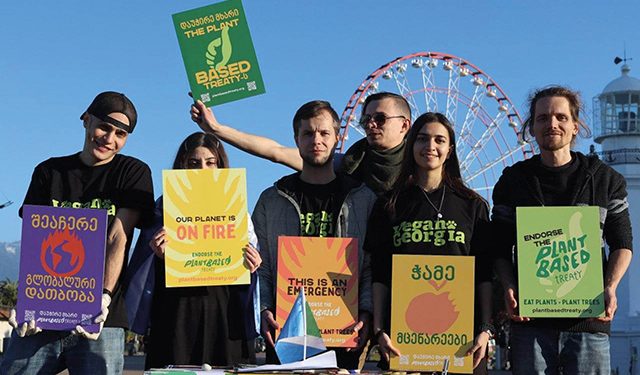There is a climate, ocean and biodiversity crisis. Fossil fuels and animal agriculture are the driving force behind runaway global warming as well as extensive biodiversity loss, large-scale deforestation, species extinction, water depletion, soil degradation and ocean dead zones.
Last Saturday, January 28, International Day against Global Warming was celebrated worldwide, with the intention to raise awareness about, and encourage people all over the world to do their part in taking care of the environment and the planet by reducing their carbon footprint.
The Plant Based Treaty Georgia and Vegan Georgia teams took it as an opportunity to remind the public that one of the best ways to reduce global warming is to switch to a vegan diet.
“One of the principal causes of global warming is animal agriculture,” they say, “which leads to the emission of carbon dioxide and other greenhouse gasses. Unable to escape into space, these gasses become trapped in the atmosphere, causing the planet to gradually warm over many decades. This then has an effect on climatic patterns, leading to long-term climate change that brings more storms, floods, droughts, forest fires and more extreme temperatures. Melting ice caps bring rising sea levels that threaten coastal cities, while greenhouse gasses that are absorbed by oceans make them more acidic, threatening coral and marine life.”
Leading up to January 28, the Plant Based Treaty (PBT) and Vegan Georgia teams promoted Saturday’s “tweetstorm” to put pressure on politicians, and to demand the adoption of a Plant Based Treaty as a companion to the UNFCCC/Paris Agreement as a step to put food systems at the heart of combating the climate crisis.
Pictures of activists were shared, showing them holding signs with: “Fight the Climate Crisis, Endorse the Plant Based Treaty,” and standing in front of well-known locations throughout the country. GEORGIA TODAY sat down with two of the local organizers to find out more. More information about the Plant Based Treaty can be found below the interviewees’ answers, and at plantbasedtreaty.org, where you can also sign up to do your bit towards fighting climate change.
What brought you to Georgia and the PBT?
Hoshimi: Interest in Georgian culture, especially Georgian dance and music, brought me here, and I’ve been working in the video team of the PBT since the launch of the campaign in August 2021.
Oleg: I came to Georgia in May 2013 to help organize the first vegan festival. That September, I settled here to continue doing animal rights activities. I met Hoshimi from the PBT team when I was a co-organizer of the International Animal Rights Gathering 2022 and she applied as a speaker. I instantly fell in love with the whole concept of PBT and their efforts.
How has reception been in Georgia so far to the PBT, and veganism in general?
Hoshimi: We started the PBT Tbilisi team in September 2022 and since then have built a strong team, and we hope to keep growing. Cafes such as Kiwi, Living Vino, Prinz Bar, and Falafel Box in Tbilisi have endorsed the PBT, and are helping raise awareness about the link to animal agriculture and the climate crisis by placing our posters, fliers, stickers, etc.
Oleg: The perception of veganism in the context of the PBT agenda is very positive, the same as the message of PBT itself, and it feels like it is going to succeed in Georgia.
What more needs to be done here?
Hoshimi: More awareness raising is needed not just here, but worldwide. Our aim is to have plant based menus accessible at hospitals, schools, prisons, etc.
Oleg: I’m hoping PBT can help “veganize” the menus of universities, prisons, kindergartens and other governmental facilities, an issue first brought up by Vegan Georgia, the first vegan NGO in Georgia, that I also represent.
What can interested people do to contribute to the growth of PBT/climate awareness in Georgia?
Hoshimi: Every day, people can do their bit by endorsing the PBT on the website, sharing our social media content, and by going vegan! We have free resources like a vegan starter kit booklet in Georgian, plus for English speakers we have free vegan challenge programs you can sign up for, also on our website
Another thing people can do is to join the PBT team if in Tbilisi and volunteer for actions, and folks in other cities can start their own PBT team!
Oleg: Many things can be done in order to get people interested in the PBT and veganism, like plant-based food giveaways, social media content and different kinds of street activities like the upcoming Climate March.
About the Plant Based Treaty
As a companion to the UNFCCC/Paris Agreement, The Plant Based Treaty initiative is a grassroots campaign designed to put food systems at the forefront of combating the climate crisis. Modeled on the popular Fossil Fuel Treaty, the Plant Based Treaty aims to halt the widespread degradation of critical ecosystems caused by animal agriculture and to promote a shift to healthier, sustainable plant-based diets. The global PBT team is urging scientists, individuals, groups, businesses and cities to endorse this call to action and put pressure on national governments to negotiate an international Plant Based Treaty.
The three main greenhouse gases, carbon dioxide, methane and nitrous oxide, are at record levels and rapidly accelerating; animal agriculture contributes to all three but is the main driver of methane and nitrous oxide emissions globally.
Animal agriculture is driving indigenous land theft in the Amazon; subjecting racially and ethnically marginalized communities to disproportionate amounts of toxic waste from factory farms and slaughterhouses, as well as exposing workers to toxic chemicals, hazardous working conditions and severe trauma.
Scientists warned in the IPCC sixth assessment that we need to cut methane or face collapse. Lead reviewer Durwood Zaelke said methane reductions were probably the only way of preventing temperature rises of 1.5C above pre-industrial levels, otherwise extreme weather will increase and several planetary tipping points could be triggered, from which there is no coming back. Zaelke points out that “cutting methane is the biggest opportunity to slow warming between now and 2040. We need to face this emergency.”
In short, the three greenhouse gases must be tackled both urgently and with equal measure. Plant-based and soft energy solutions that can mitigate this disaster are within our grasp; we just need to implement them.
More info at: Instagram @plantbasedtreaty and @pbt.tbilisi
Twitter – @plant_treaty
Facebook – Plant Based Treaty
By Katie Ruth Davies














